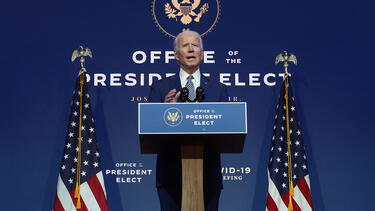All Insights Articles
Weakening Unions Can Lead to Gender Gap in Wages
In 2011, legislation in Wisconsin reduced the power of unions to negotiate teachers’ salaries. Within five years, male teachers started earning more than women did.

Trump’s Reluctant Goodbye
In the final act of Donald Trump‘s presidency, Yale SOM's Jeffrey Sonnenfeld sees echoes of “monarchical” CEOs who purge truth-tellers and surround themselves with sycophants—and invariably make an involuntary exit from the C-suite.

Maintaining Momentum on Climate Change
Tyler Van Leeuwen ’14 of Shell explains explains how his internal skunkworks team helps move Shell toward its decarbonization goals.

Study Shows Which Restrictions Prevent COVID-19 Fatalities—and Which Appear to Make Things Worse
New research from Yale SOM’s Heather Tookes and Matthew Spiegel finds that mask mandates, closing restaurants, and stay-at-home orders are all effective at saving lives, but other commonly used measures can actually worsen the spread of the pandemic.

Is it Time to Shut Down the Fed’s COVID Stimulus Programs?
Prof. Andrew Metrick, director of the Yale Program on Financial Stability, says that the four emergency lending programs recently shut down by Treasury Secretary Steven Mnuchin are an insurance policy that may be badly needed in 2021.

No Matter What We Earn, We Believe Our Richer Neighbors Have More to Give
According to a new study co-authored by Yale SOM’s Gal Zauberman, people of a wide range of income levels believe that they are giving what they should to charity—but that even richer people have more spare income and a greater obligation to give.

To Tackle Plastics Pollution, Embrace a Circular Economy
To cut down on plastics pollution, says Matt Kopac ’09, sustainable business and innovation manager at Burt’s Bees, we need a fundamentally different approach to sustainability.

Pharma Collaborates in the Fight against the Pandemic
Nandish Poluru ’13 discusses the pharmaceutical industry’s unprecedented cooperative efforts to treat and prevent COVID-19.

A Life-Changing Vaccine, If We Do It Right
Pfizer’s announcement that its experimental COVID-19 vaccine appears to be more than 90% effective has provided hope for relief from the increasingly calamitous onslaught of the virus. We asked Yale SOM’s Dr. Howard Forman about next steps.

CEOs Urge Respect for Election Integrity
In a hastily assembled call on November 6, corporate leaders agreed on the importance of smooth transition process and encouraged GOP leaders to endorse the integrity of the election.
